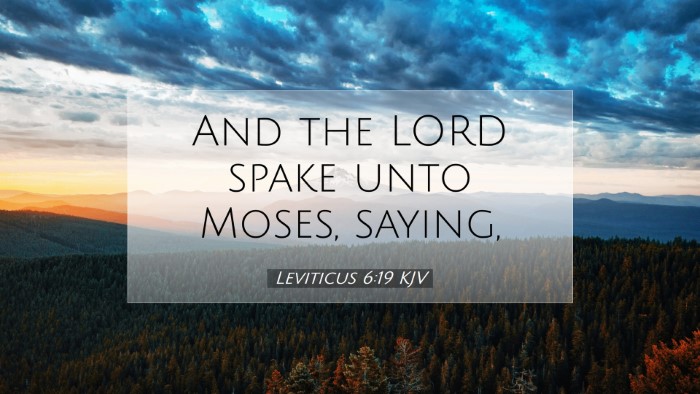Commentary on Leviticus 6:19
Verse: "This is the law of the grain offering: The sons of Aaron shall offer it before the Lord, in front of the altar." (Leviticus 6:19, ESV)
Introduction
Leviticus 6:19 presents an important aspect of the grain offering, which is one of the key offerings prescribed in the Mosaic law. This verse serves not only as an instruction but also as a doorway into understanding the deeper theological concepts surrounding the offerings in the Old Testament. The interpretation of this verse informs a pastoral approach to worship, sacrifice, and the holiness of God.
General Overview
The significance of the grain offering, or meal offering, can be understood through three primary lenses: symbolism, fulfillment, and application. The offerings served as vehicles through which believers expressed their devotion to God, acknowledged His sovereignty, and sought reconciliation.
Symbolism
According to Matthew Henry, the grain offering symbolized gratitude and the worshiper's acknowledgment of God's provision (Henry’s Commentary). It consists of fine flour, mixed with oil and frankincense, indicating purity and the richness of the offering. The act of offering was a sign of respect towards God and recognition of His blessings in life.
Albert Barnes elaborates further on the components of the grain offering, highlighting that the flour represents the labor of the harvest, suggesting the acknowledgment of God's provision in every aspect of life. The oil signifies the presence and anointing of the Holy Spirit, indicating that all acts of worship must be enshrined in the Spirit of God (Barnes’ Notes).
Fulfillment
In Christianity, the grain offering is often viewed in light of Christ. Adam Clarke notes that Jesus Himself is seen as the ultimate fulfillment of all Old Testament sacrifices (Clarke’s Commentary). Just as the grain offering was offered before the altar, Christ was offered as the supreme sacrifice that brings believers into communion with God.
The act of offering grain became a precursor to understanding the significance of Christ's sacrificial death, which was born of complete obedience, much like the regulations set forth in this verse regarding offerings. This relationship is profound for theologians and students of Scripture as it highlights the continuity of God’s redemptive plan throughout the Scriptures.
Applications
The implications of Leviticus 6:19 extend beyond the historical context into the practices of faith today. Pastors and theologians can draw from this verse to teach congregations about the importance of offering not just material goods but also spiritual offerings that represent the believer’s life surrendered to God.
Practical Worship
- Acts of Former Generosity: Believers today should consider their approach to giving. Campbell Morgan emphasized that God desires our best, much like the high standards presented in the laws of sacrifice (Morgan's Method of Bible Study).
- Worship as Holistic Offering: With the grain offering being dependent on proper procedure, believers are reminded that worship ought to be done in spirit and truth (John 4:24). This encourages a personal reflection of the state of one’s heart while approaching God.
- Community and Altar: It is also noted by John Gill that offerings were presented by Aaron's sons, representing community and a public expression of faith—the body of Christ offering sacrifices together (Gill’s Exposition of the Entire Bible).
Reflections on God’s Provision
An understanding of how God provides should lead believers to thankfulness. As the grain offering was a representation of thanking God for the harvest, so too should modern-day offerings symbolize an acknowledgment of God's daily provisions. This can lead to a more profound expression of gratitude and reliance on God.
Conclusion
Leviticus 6:19 is loaded with meaning, providing insights into the nature of worship, the eternal sacrifice of Christ, and the belief in God's ongoing provision. For pastors, students, and theologians, it challenges us to examine both our actions in worship and the posture of our hearts as we bring our lives before the altar.
In summation, this verse is not only a directive concerning ritual but a rich tapestry intertwining practical living with spiritual truths that resonate throughout Scripture. Let us then approach the Word with diligence, celebrating the dimensions of God's character that are displayed through these ancient practices.


